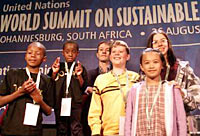 With world leaders pushing for action, negotiators at the World Summit agreed Monday on a plan geared to help the globe's poorest people while reversing environmental declines.
With world leaders pushing for action, negotiators at the World Summit agreed Monday on a plan geared to help the globe's poorest people while reversing environmental declines.
Agreement came as participants resolved the last main sticking points in a 70-page action blueprint that seeks solutions to a range of issues energy, clean water, health and sanitation.
The plan urged using a variety of energy sources that included both wind and solar power as well as fossil fuels a victory for the United States and other oil-producing countries.
"Humanity has a rendezvous with destiny," French President Jacques Chirac declared. Alarms are sounding across all the continents. We cannot say that we did not know!"
"The persistence of mass poverty is outrageous and an aberration," Chirac said. The world, he said, "is suffering from poor development, in both the North and South, and we stand indifferent."
The 10-day conference, which started a week ago and ends Wednesday, aims to shape an agreement to turn promises made at the 1992 Earth Summit in Rio de Janeiro, Brazil, into reality.
U.N. Secretary-General Kofi Annan urged the more than 100 world leaders in Johannesburg to commit to firm action to solve problems identified a decade ago at Rio.
"The model of development we are accustomed to has been fruitful for the few, but flawed for the many," Annan said. "A path to prosperity that ravages the environment and leaves a majority of humankind behind in squalor will soon prove to be a dead-end road for everyone."
"Here in Johannesburg we must do more."
The agreed text includes a commitment to "urgently" increase the use of renewable energy sources, but sets no deadlines. Developing countries had sided with the United States and Japan against including targets that the European Union sought.
The United States and oil-producing countries had resisted targets, arguing that concrete projects were more important than paper agreements.
"The document clearly highlights the need to increase access to modern energy services and signals the valuable role renewable energy will play in the future," said Undersecretary of State Paula Dobriansky, head of the U.S. delegation.
Compromises were also reached in climate change, trade and sanitation.
The negotiators also called for a reduction in the number of people living without sanitation from 2 billion currently to 1 billion by 2015.
Despite the Bush administration's refusal to ratify the Kyoto Protocol on climate change, it accepted language that says nations backing Kyoto "strongly urge" states that have not done so to ratify it in "a timely manner."`
Kyoto got another boost Monday when Canadian Prime Minister Jean Chretien, who had been wavering on whether to ratify, confirmed he would submit it to parliament by the end of the year.
But the accord cannot go into effect unless Russia the crucial holdout signs on too. The EU issued a "solemn appeal" to Moscow to join them in ratifying, but Russian Prime Minister Mikhail Kasyanov said his government was not ready to decide.
The trade agreements urged countries to reform subsidies that are environmentally harmful, such as those for the fishing industry that contribute to overcapacity.
The United States accepted the new timetable despite earlier insistence that the way to get results is through concrete projects, not paper agreements.
Negotiators agreed to emphasize the need for good governance to achieve sustainable development, but did not make it a condition for receiving aid as advocated by the United States, diplomats said.
Though President Bush declined to come sending U.S. Secretary of State Colin Powell in his place U.S. officials say they are firmly committed to the summit's success.
"We've reached a real breakthrough with the summit in our collective attempt to ensure that this is a successful gathering of the global family," said Assistant Secretary of State John Turner.
Turner said the text went "beyond anything the world community had done before" in stressing the need to fight corruption and promote democracy and the rule of law.
A host of civic and environmental groups condemned the compromises, calling some of them a significant step backward from previous commitments.
"Economic interests were allowed to maintain their primacy over other global priorities," said Kim Carstensen of World Wildlife Fund International.
World leaders have yet to formally adopt the nonbinding agreement but they insisted the most important measure of success would be whether the summit ends with concrete plans to tackle the problems first identified in Rio 10 years ago.
Italian Premier Silvio Berlusconi announced Italy was prepared to cancel $4 billion in debt to poor countries. Germany offered $500 million over five years for renewable energy projects. Japan promised $30 million in emergency food aid for children facing famine in southern Africa.
"This is not charity, it is an investment in our collective future," said British Prime Minister Tony Blair.
(China Daily September 3, 2002)
|

